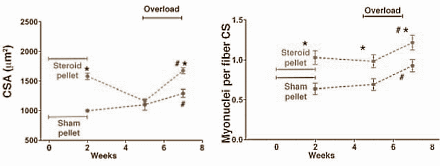|
Definition: "An ergogenic aid is any substance or phenomenon that enhances performance "
|
|
||||||||
01.12.2013 |
|
|
Testosterone propionate can have permanent effect on muscles, says animal study
In 2010 the Norwegians published an animal study in PNAS in which they described how muscle memory works. [Proc Natl Acad Sci U S A. 2010 Aug 24;107(34):15111-6.] We borrowed the figure below from the publication.
If you train muscles the fibres absorb more stem cells. These stem cells then grow into adult muscle cells in the muscles.
The increase in the number of muscle cells in your muscle fibres makes your muscles stronger and bigger. If you stop training, then your muscle cells will become smaller, but the extra cells remain in your muscles.
In 2010 the Norwegians concluded that strength athletes can continue to derive benefit from their muscle strength into old age. Moreover, the researchers suspect that steroids users continue to derive benefit from the courses they've taken for years after stopping.
"Anabolic steroids have been shown to increase the number of nuclei", the researchers write. "Thus, the benefits of using steroids might be permanent and should have consequences for the exclusion time after a doping offense."
As a result of the raised testosterone level, the number of muscle cells in the muscle fibres [Myonuclei] of the mice in the testosterone group increased by 66 percent. Their muscle fibres became 77 percent thicker [CSA].
After fourteen days the researchers stopped administering testosterone propionate. The number of muscle cells in the mice's muscle fibres remained the same, but the dimensions of the muscle fibres decreased.
After a period of three months the researchers forced the mice to exercise their muscles more than normal for a period of six days [Overload]. The muscles of the mice that had received testosterone grew faster than those of the mice in the other group.
"Our data demonstrate that in least in mice, an episode of testosterone use may recruit a long lasting pool of excess myonuclei, and a persistent increased ability to regain muscle mass by resistance exercise in the absence of further steroid exposure", the Norwegians write. "Thus, the benefits of even episodic drug abuse might be long lasting if not permanent in athletes. Our data suggests that World Anti-Doping Code calling for only two years of ineligibility after a conviction for steroid use, should be reconsidered."
The study was partly financed by Anti Doping Norway and the WADA.
Source:
More:
|
|




